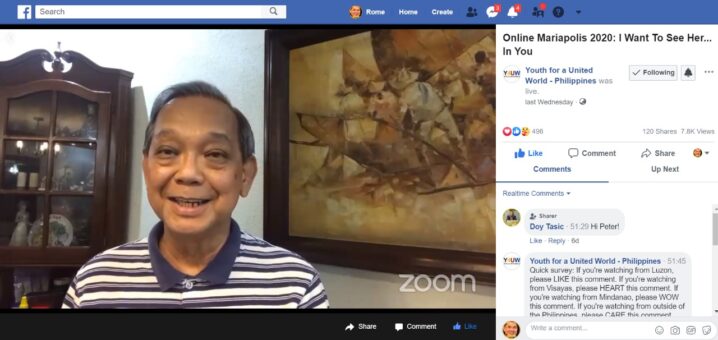
Jun 11, 2020 | Non categorizzato
“Necessity is the mother of invention.” Following this slogan, the Focolare community of the metropolitan area of Manila, Philippines, organized the very first Online Mariapolis on May 14 and 15. 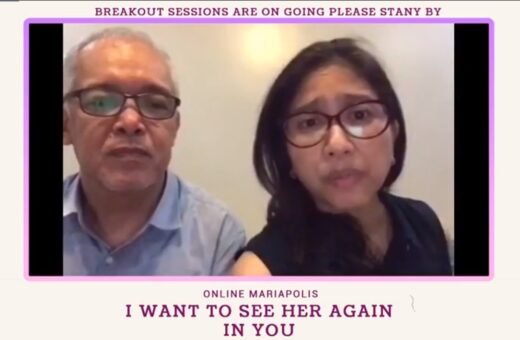 “We were on the verge of separation. With just the two of us together once the lockdown began, we felt we had to confront our issues, set aside our differences and start again. Thank you for all your love.” This was just one among many of the feedback we got from those who registered and participated via Zoom for the first ever Online Mariapolis held on May 14 and 15, 2020 in the Philippines. The unexpected Enhanced Community Quarantine due to Covid-19 pushed us to look for means to connect our people and sustain them through the spirituality of unity. The whole idea was an offshoot of the online Mass that we began live streaming privately to a small group of focolare members. Soon after, it became a daily appointment, with our Facebook group for the Mass reaching the homes of around two thousand people. We felt that if God hindered the possibility to carry on our big plans to “celebrate and meet” Chiara on her centenary, He opened this way, to do the same, in small bursts! From the outpouring of our Mass attendees through comments on Facebook Live, it was crystal clear that even for 30 minutes on a virtual platform, people are able to make an experience of God!
“We were on the verge of separation. With just the two of us together once the lockdown began, we felt we had to confront our issues, set aside our differences and start again. Thank you for all your love.” This was just one among many of the feedback we got from those who registered and participated via Zoom for the first ever Online Mariapolis held on May 14 and 15, 2020 in the Philippines. The unexpected Enhanced Community Quarantine due to Covid-19 pushed us to look for means to connect our people and sustain them through the spirituality of unity. The whole idea was an offshoot of the online Mass that we began live streaming privately to a small group of focolare members. Soon after, it became a daily appointment, with our Facebook group for the Mass reaching the homes of around two thousand people. We felt that if God hindered the possibility to carry on our big plans to “celebrate and meet” Chiara on her centenary, He opened this way, to do the same, in small bursts! From the outpouring of our Mass attendees through comments on Facebook Live, it was crystal clear that even for 30 minutes on a virtual platform, people are able to make an experience of God!  In the meantime, we had our first experiences with Zoom, for example during the United World Week and the Run4Unity. We felt we had to go for the Online Mariapolis, in order to be with and beside our people, in this very difficult moment. We were against very big odds: the “Mariapolites” would be with all the distractions at home, and would most probably be multitasking – there would be children to look after, meals to cook, chores to finish, etc. Another major challenge would be the disparities in internet connectivity and service in a developing country like ours. Because of this, our Mariapolis were held for 2 days only, and just for 2 hours each time. We also considered to call it another name, not Mariapolis, so as to manage the expectations of people. But in the end, we all wanted it to be Mariapolis – just like every other Mariapolis we have had. And we wanted it not as a webinar, but a Mariapolis, a City of Mary, because we felt that we needed Mary now and that we have to be Mary, as Chiara taught us, to bring Jesus-in-our-midst, to our people, so that this experience may help give light to their experience of the pandemic. Registered Mariapolites reached about 950, not only from the Philippines, but also from other Asian countries, from Latin America, Canada, the United States and some even from Europe. The program, which was made available via live streaming for an unlimited number of participants, was composed of songs, Gospel-based experiences related to the current pandemic situation, spiritual inputs and an hour of in-depth communion during the breakout groups. One participant meaningfully expressed what this Mariapolis was: “For me it was really a very concrete sign of Mary’s love for all of us! As our mother, she really knows our personal and shared needs. Through the well-chosen theme, talks, experiences, and songs, she nourished us with the right food and vitamins both for the body and the soul.”
In the meantime, we had our first experiences with Zoom, for example during the United World Week and the Run4Unity. We felt we had to go for the Online Mariapolis, in order to be with and beside our people, in this very difficult moment. We were against very big odds: the “Mariapolites” would be with all the distractions at home, and would most probably be multitasking – there would be children to look after, meals to cook, chores to finish, etc. Another major challenge would be the disparities in internet connectivity and service in a developing country like ours. Because of this, our Mariapolis were held for 2 days only, and just for 2 hours each time. We also considered to call it another name, not Mariapolis, so as to manage the expectations of people. But in the end, we all wanted it to be Mariapolis – just like every other Mariapolis we have had. And we wanted it not as a webinar, but a Mariapolis, a City of Mary, because we felt that we needed Mary now and that we have to be Mary, as Chiara taught us, to bring Jesus-in-our-midst, to our people, so that this experience may help give light to their experience of the pandemic. Registered Mariapolites reached about 950, not only from the Philippines, but also from other Asian countries, from Latin America, Canada, the United States and some even from Europe. The program, which was made available via live streaming for an unlimited number of participants, was composed of songs, Gospel-based experiences related to the current pandemic situation, spiritual inputs and an hour of in-depth communion during the breakout groups. One participant meaningfully expressed what this Mariapolis was: “For me it was really a very concrete sign of Mary’s love for all of us! As our mother, she really knows our personal and shared needs. Through the well-chosen theme, talks, experiences, and songs, she nourished us with the right food and vitamins both for the body and the soul.”
Romé Vital
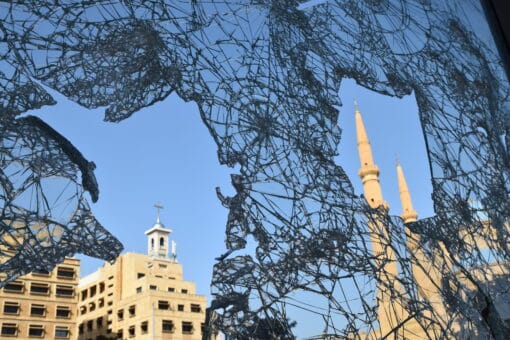
Jun 9, 2020 | Non categorizzato
The land of cedar trees, discusses ways that may help the country emerge from the serious political-economic crisis that hit it recently. Hope never dies in a country that has passed through so much hardship.  During the recent United World Week, the Lebanese Focolare community opted to discuss, with both youths and adults, the difficult way foward in a country gripped by tensions and facing several crises. The political-social crisis has been going on since last October 17, when the “thawra” movement in Lebanon started protesting against a government accused of corruption and bad administration. The economic crisis exploded last March, when the government declared it could not repay its1.2 billion dollar debt to the European Union. In recent weeks there was also the collapse of the Lebanese pound, set at 1500 pounds to one dollar up to a few weeks ago and now trading for more than 4000. Lebanon is also facing a health crisis due to the coronavirus. The spread of the virus has not been excessive (less than a thousand people have been infected and there were less than 30 deaths) but the extended lockdown measures also hit the country. Owing to lack of prospects, this situation seems to be encouraging people, especially young ones, to go back to an old tradition, namely expatriation. It is good to know that for every 4 Lebanese living in the Middle East, there are about 12 others living in other different parts of the world. This is happening also in other neighbouring countries, especially with Jews, Palestinians and Armenians. Emigration is particularly painful for the Lebanese, who believe (and it is true) that they have an amazing country, rich in history and natural beauty, a Middle Eastern crossroads for every kind of traffic and commerce, home of Nobel Prize winners and great merchants, filmmakers and writers, saints and scientists. One needs to highlight the fact that the diaspora is very painful for the Lebanese, especially when one considers their strong family ties. In this context, the local Focolare Movement organized a Webinar with the specific title “Building a future by living for fraternity”. About 300 people from different countries, from Canada to Australia, to Spain and Italy, participated. The two lawyers, Mona Farah and Myriam Mehannan spoke about one of the most serious threats that Lebanon is facing, namely the dangerous lack of certainty about the rule of law. Yet, Lebanon has a remarkable capacity to find the best solutions in complex situations and boasts of a very ancient legal tradition. Therefore one can understand the young people’s desire to leave the country and at the same time the will of many who want to remain to build a more united and fraternal Lebanon, where 18 confessional communities are united by a political system of “confessional democracy” unique in the world. Then came the testimonies of two young couples, who decided to return to Lebanon twelve years ago, after working abroad for some time. They came back to contribute towards rebuilding their country after the so-called civil war. Imad and Clara Moukarzel,who work in the social and humanitarian field and Fady and Cynthia Tohme, who are both doctors, testified that it is possible to stay or return to Lebanon not to leave such a rich country in the hands of the most reactionary forces. Tony Ward, an entrepreneur in the field of high fashion, recounted his decision to return home twenty years ago, even though he was working in an established world fashion environment. He also spoke about his production change during the coronavirus crisis; for a few weeks he decided to produce sheets, masks and protection suits needed at Lebanese hospitals caring for Covid-19 patients. Tony Haroun, who has been working as a dentist in France for more than thirty years, spoke about the difficulties of expatriates, especially cultural ones, while he strongly affirmed that the willingness to listen to God’s voice allows one to overcome all sorts of obstacles. Michele Zanzucchi, a journalist and a writer based in Lebanon, highlighted three qualities of the Lebanese people, qualities that can really be of great help in the current situation.He spoke of their resilience, that is their ability to face setbacks without being crushed by them; their subsidiarity, namely their ability to replace the State when it fails to provide essential services; and finally he mentioned creativity to which the Lebanese attribute great value while creating an infinity of projects: humanitarian, economic, commercial, political and so on. Youmna Bouzamel, the young moderator of the Webinar, concluded by emphasizing that Lebanon seems to have all the qualities needed to welcome the message of fraternity and that this is the only real possibility that the country possesses. If John Paul II said that “Lebanon is more than a nation, more than a country, it is a message”, today’s message is above all one that proclaims fraternity. Great ideals and realism combined together.
During the recent United World Week, the Lebanese Focolare community opted to discuss, with both youths and adults, the difficult way foward in a country gripped by tensions and facing several crises. The political-social crisis has been going on since last October 17, when the “thawra” movement in Lebanon started protesting against a government accused of corruption and bad administration. The economic crisis exploded last March, when the government declared it could not repay its1.2 billion dollar debt to the European Union. In recent weeks there was also the collapse of the Lebanese pound, set at 1500 pounds to one dollar up to a few weeks ago and now trading for more than 4000. Lebanon is also facing a health crisis due to the coronavirus. The spread of the virus has not been excessive (less than a thousand people have been infected and there were less than 30 deaths) but the extended lockdown measures also hit the country. Owing to lack of prospects, this situation seems to be encouraging people, especially young ones, to go back to an old tradition, namely expatriation. It is good to know that for every 4 Lebanese living in the Middle East, there are about 12 others living in other different parts of the world. This is happening also in other neighbouring countries, especially with Jews, Palestinians and Armenians. Emigration is particularly painful for the Lebanese, who believe (and it is true) that they have an amazing country, rich in history and natural beauty, a Middle Eastern crossroads for every kind of traffic and commerce, home of Nobel Prize winners and great merchants, filmmakers and writers, saints and scientists. One needs to highlight the fact that the diaspora is very painful for the Lebanese, especially when one considers their strong family ties. In this context, the local Focolare Movement organized a Webinar with the specific title “Building a future by living for fraternity”. About 300 people from different countries, from Canada to Australia, to Spain and Italy, participated. The two lawyers, Mona Farah and Myriam Mehannan spoke about one of the most serious threats that Lebanon is facing, namely the dangerous lack of certainty about the rule of law. Yet, Lebanon has a remarkable capacity to find the best solutions in complex situations and boasts of a very ancient legal tradition. Therefore one can understand the young people’s desire to leave the country and at the same time the will of many who want to remain to build a more united and fraternal Lebanon, where 18 confessional communities are united by a political system of “confessional democracy” unique in the world. Then came the testimonies of two young couples, who decided to return to Lebanon twelve years ago, after working abroad for some time. They came back to contribute towards rebuilding their country after the so-called civil war. Imad and Clara Moukarzel,who work in the social and humanitarian field and Fady and Cynthia Tohme, who are both doctors, testified that it is possible to stay or return to Lebanon not to leave such a rich country in the hands of the most reactionary forces. Tony Ward, an entrepreneur in the field of high fashion, recounted his decision to return home twenty years ago, even though he was working in an established world fashion environment. He also spoke about his production change during the coronavirus crisis; for a few weeks he decided to produce sheets, masks and protection suits needed at Lebanese hospitals caring for Covid-19 patients. Tony Haroun, who has been working as a dentist in France for more than thirty years, spoke about the difficulties of expatriates, especially cultural ones, while he strongly affirmed that the willingness to listen to God’s voice allows one to overcome all sorts of obstacles. Michele Zanzucchi, a journalist and a writer based in Lebanon, highlighted three qualities of the Lebanese people, qualities that can really be of great help in the current situation.He spoke of their resilience, that is their ability to face setbacks without being crushed by them; their subsidiarity, namely their ability to replace the State when it fails to provide essential services; and finally he mentioned creativity to which the Lebanese attribute great value while creating an infinity of projects: humanitarian, economic, commercial, political and so on. Youmna Bouzamel, the young moderator of the Webinar, concluded by emphasizing that Lebanon seems to have all the qualities needed to welcome the message of fraternity and that this is the only real possibility that the country possesses. If John Paul II said that “Lebanon is more than a nation, more than a country, it is a message”, today’s message is above all one that proclaims fraternity. Great ideals and realism combined together.
Pietro Parmense
Jun 8, 2020 | Non categorizzato
The Gospel is the Word of God expressed in human words and for this reason it is a source of ever new life, even during the pandemic. But in order for this life to develop, we need to put Jesus’ words into practice, to translate them into concrete acts of faith, love and hope. … “If you say so, I will let down the nets” (Lk 5:5). In order for Peter to experience the power of God, Jesus asked him to have faith. He asked him to believe in Him and to believe in something which was impossible from a human point of view, indeed absurd: to let down his nets during the day after a fruitless night. If we want life to come back to us, if we want to experience a miraculous catch of happiness, we too must have faith and, if necessary, take the risk of believing in the absurd things that at times his Word requires. We know that the Word of God is Life, but we obtain this life by going through death. We gain this life, but have it by losing it; it is growth, but we reach this growth by becoming less. So what must we do? How can we come out of the state of spiritual tiredness in which some of us may find ourselves? By taking on the risks that his Word implies. We are often influenced by the mentality of the world in which we live and end up believing that happiness is found in what we possess, in asserting ourselves, in enjoying ourselves, in lording it over others, in being noticed, in satisfying our senses by eating or drinking. But in fact it is not like that. Let’s try taking the risk of cutting away all these things. Let’s allow our ego to run the risk of a complete death. Let’s risk it, let’s risk it! Once, twice, even ten times a day. What will happen? In the evening we will find that love has gently blossomed in our hearts once more. We will find union with God in a way we could not have hoped for. The light of his unmistakeable inspirations will shine out again. His peace and consolation will fill our hearts and we will feel that we are enveloped by His Fatherly love once more. Enveloped by his protection, we will find that strength, hope and trust grow in us again and will be sure that the Holy Journey is possible. … We will be sure that the world can belong to God. But we need to take the risk of dying to ourselves, nothingness and detachment. This is the price to pay! Take courage then! Let’s take risks based on his Word in order to obtain a miraculous catch of happiness in our hearts, and in the hearts of many who love God.
Chiara Lubich
Taken from a telephone conference call Rocca di Papa, 17th February 1983
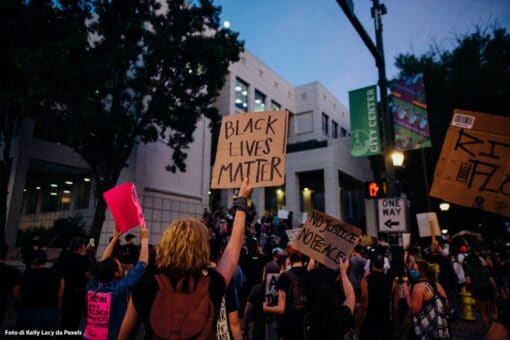
Jun 7, 2020 | Non categorizzato
After the events in Minneapolis and the demonstrations worldwide we feel powerless and outraged, yet we continue to believe and work for a spirit of openness and participation so as to address the deepest needs of our time.
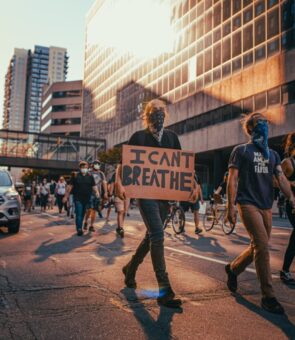
Foto: Josh Hild (Pexels)

Foto: Kelly Lacy Pexes)
Stefania Tanesini
[1] [1] Statement of U.S. Focolare Movement: our commitment to racial justice – https://www.focolare.org/usa/files/2020/06/Focolare-Statement-on-Racial-Justice.pdf [2] ibid
Jun 6, 2020 | Non categorizzato
Testimony from Congo after difficult months fighting the Ebola virus. https://vimeo.com/402904193
Jun 5, 2020 | Non categorizzato
The Focolare’s Movement’s ‘universal vocation’ to build universal fraternity without distinction of race, religion, social or economic status. Part two of our interview with self-declared ‘non-believer’, Luciana Scalacci, member of the International and Italian Commissions of the Focolare’s Center of Dialogue with people of non-religious convictions. As a non-believer, how did you come across the Focolare? What impact did it have on you? One day our daughter wrote that she’d found a place where she could put into practice the values we had passed on to her. She had met the Focolare community in Arezzo. We’d never heard of the Movement and were naturally rather concerned. So we went along to see what it was all about. Immediately we had the impression of being in a place where other people’s ideas were treated with respect. We found a rare kind of openness among the people there. Meeting the Focolare Movement was like a light which allowed me to hope again in the possibility of building a better world. You met Chiara Lubich several times. How important has this personal relationship been for you? In an open meeting in 2000, Chiara answered one of my questions saying, “for us too, humanity has the solution for humanity. But precisely who in humanity? For us, it’s Jesus, the man Jesus. So take him for yourselves too, because he’s one of you, he’s a man”. That’s when I understood the Focolare Movement was a place where I could be active. I also understood why, even as a non-believer, I’ve always been fascinated by the figure of Jesus of Nazareth. As this dialogue has progressed over the years, how have you moved from a “them” and “us” to feeling united together in “us”? Our initial scepticism is the first thing to overcome. On our side, as non-believers, there’s the fear that it’s all aimed at proselytizing us. On the side of the believers, I think there may be a concern that we’ll try to shake their certainties and their faith. The only one who never had any kind of worry about it was Chiara herself! We’ve increasingly experienced that the one great resource for advancing towards the goal of universal fraternity is dialogue. Gradually we’ve established trust between both “sides”, until we no longer feel “them and us” but “united in us”. How do you find young people responding to this option of dialogue? Not all young people are well informed about such openness towards those who don’t adhere to any religious faith. But those who’ve had the opportunity of getting to know about it show a real interest in this reality. After meeting us recently, one girl wrote, “I see this dialogue like a face in a precious diamond, entrusted to us by Chiara … let’s be sure to keep it shining!” Click here to read Part 1 of the interview
Claudia Di Lorenzi

 “We were on the verge of separation. With just the two of us together once the lockdown began, we felt we had to confront our issues, set aside our differences and start again. Thank you for all your love.” This was just one among many of the feedback we got from those who registered and participated via Zoom for the first ever Online Mariapolis held on May 14 and 15, 2020 in the Philippines. The unexpected Enhanced Community Quarantine due to Covid-19 pushed us to look for means to connect our people and sustain them through the spirituality of unity. The whole idea was an offshoot of the online Mass that we began live streaming privately to a small group of focolare members. Soon after, it became a daily appointment, with our Facebook group for the Mass reaching the homes of around two thousand people. We felt that if God hindered the possibility to carry on our big plans to “celebrate and meet” Chiara on her centenary, He opened this way, to do the same, in small bursts! From the outpouring of our Mass attendees through comments on Facebook Live, it was crystal clear that even for 30 minutes on a virtual platform, people are able to make an experience of God!
“We were on the verge of separation. With just the two of us together once the lockdown began, we felt we had to confront our issues, set aside our differences and start again. Thank you for all your love.” This was just one among many of the feedback we got from those who registered and participated via Zoom for the first ever Online Mariapolis held on May 14 and 15, 2020 in the Philippines. The unexpected Enhanced Community Quarantine due to Covid-19 pushed us to look for means to connect our people and sustain them through the spirituality of unity. The whole idea was an offshoot of the online Mass that we began live streaming privately to a small group of focolare members. Soon after, it became a daily appointment, with our Facebook group for the Mass reaching the homes of around two thousand people. We felt that if God hindered the possibility to carry on our big plans to “celebrate and meet” Chiara on her centenary, He opened this way, to do the same, in small bursts! From the outpouring of our Mass attendees through comments on Facebook Live, it was crystal clear that even for 30 minutes on a virtual platform, people are able to make an experience of God!  In the meantime, we had our first experiences with Zoom, for example during the United World Week and the Run4Unity. We felt we had to go for the Online Mariapolis, in order to be with and beside our people, in this very difficult moment. We were against very big odds: the “Mariapolites” would be with all the distractions at home, and would most probably be multitasking – there would be children to look after, meals to cook, chores to finish, etc. Another major challenge would be the disparities in internet connectivity and service in a developing country like ours. Because of this, our Mariapolis were held for 2 days only, and just for 2 hours each time. We also considered to call it another name, not Mariapolis, so as to manage the expectations of people. But in the end, we all wanted it to be Mariapolis – just like every other Mariapolis we have had. And we wanted it not as a webinar, but a Mariapolis, a City of Mary, because we felt that we needed Mary now and that we have to be Mary, as Chiara taught us, to bring Jesus-in-our-midst, to our people, so that this experience may help give light to their experience of the pandemic. Registered Mariapolites reached about 950, not only from the Philippines, but also from other Asian countries, from Latin America, Canada, the United States and some even from Europe. The program, which was made available via live streaming for an unlimited number of participants, was composed of songs, Gospel-based experiences related to the current pandemic situation, spiritual inputs and an hour of in-depth communion during the breakout groups. One participant meaningfully expressed what this Mariapolis was: “For me it was really a very concrete sign of Mary’s love for all of us! As our mother, she really knows our personal and shared needs. Through the well-chosen theme, talks, experiences, and songs, she nourished us with the right food and vitamins both for the body and the soul.”
In the meantime, we had our first experiences with Zoom, for example during the United World Week and the Run4Unity. We felt we had to go for the Online Mariapolis, in order to be with and beside our people, in this very difficult moment. We were against very big odds: the “Mariapolites” would be with all the distractions at home, and would most probably be multitasking – there would be children to look after, meals to cook, chores to finish, etc. Another major challenge would be the disparities in internet connectivity and service in a developing country like ours. Because of this, our Mariapolis were held for 2 days only, and just for 2 hours each time. We also considered to call it another name, not Mariapolis, so as to manage the expectations of people. But in the end, we all wanted it to be Mariapolis – just like every other Mariapolis we have had. And we wanted it not as a webinar, but a Mariapolis, a City of Mary, because we felt that we needed Mary now and that we have to be Mary, as Chiara taught us, to bring Jesus-in-our-midst, to our people, so that this experience may help give light to their experience of the pandemic. Registered Mariapolites reached about 950, not only from the Philippines, but also from other Asian countries, from Latin America, Canada, the United States and some even from Europe. The program, which was made available via live streaming for an unlimited number of participants, was composed of songs, Gospel-based experiences related to the current pandemic situation, spiritual inputs and an hour of in-depth communion during the breakout groups. One participant meaningfully expressed what this Mariapolis was: “For me it was really a very concrete sign of Mary’s love for all of us! As our mother, she really knows our personal and shared needs. Through the well-chosen theme, talks, experiences, and songs, she nourished us with the right food and vitamins both for the body and the soul.” 


